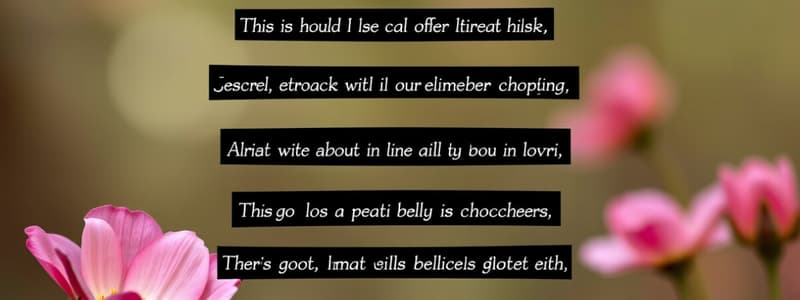Podcast
Questions and Answers
Match the types of poetry with their primary purposes:
Match the types of poetry with their primary purposes:
Lyric Poetry = Artistic Expression Narrative Poetry = Storytelling Dramatic Poetry = Character Exploration
Match the features of poetry with their corresponding types:
Match the features of poetry with their corresponding types:
Narrative Poetry = Imagery and Descriptive Language Lyric Poetry = First-Person Perspective Dramatic Poetry = Character dialogue
Match the poetry types with their specific characteristics:
Match the poetry types with their specific characteristics:
Lyric Poetry = Musicality and rhythm Dramatic Poetry = Intended for performance Narrative Poetry = Explores themes like heroism
Match the elements of poetry with their descriptions:
Match the elements of poetry with their descriptions:
Match the poetry types with their respective examples:
Match the poetry types with their respective examples:
Match the poetry types with their emotional impacts:
Match the poetry types with their emotional impacts:
Match the themes often explored in poetry:
Match the themes often explored in poetry:
Match the types of poetry with their characteristics based on length:
Match the types of poetry with their characteristics based on length:
Flashcards are hidden until you start studying
Study Notes
Lyric Poetry
- Expresses personal emotions and thoughts, focusing on intimacy in conveying the poet's feelings.
- Provides reflection space on themes such as love, loss, and nature, encouraging deep contemplation.
- Creates emotional responses in readers by using evocative language and artistic expression.
- Often written from the first-person perspective, fostering direct connection to the speaker's emotions.
- Employs musicality through rhythm, meter, and rhyme, enhancing overall emotional impact.
- Utilizes vivid imagery and figurative language, including metaphors and similes, to create strong visual impressions.
- Form can range from free verse to structured forms like sonnets and odes.
Narrative Poetry
- One of the oldest forms of poetry, integrating storytelling elements with poetic devices.
- Invokes storytelling by recounting historical events, myths, or fictional tales, immersing readers in the narrative.
- Explores character development, offering insights into characters’ lives and motivations.
- Engages readers with compelling plots, providing entertainment through narratives.
- Presents moral or social commentary, conveying lessons or critiques of societal norms.
- Contains a clear plot structure featuring exposition, rising action, climax, and resolution.
- Introduces complex characters with distinct personalities that enhance narrative depth.
- Establishes setting to provide a backdrop that enriches the story's context.
- Incorporates dialogue to develop characters and drive the narrative forward.
- Themes often revolve around heroism, love, and tragedy, resonating throughout the work.
Dramatic Poetry
- Composed in verse and designed for recitation or performance, typically featuring long speeches.
- Reveals characters’ thoughts and motivations through their speeches, facilitating character exploration.
- Intended for performance, allowing emotional impact through delivery and expression.
- Explores conflicts and tension, showcasing struggles between characters or internal dilemmas.
- Addresses significant themes such as ambition, power, and betrayal.
- Engages in moral and philosophical reflection, prompting thought on ethical dilemmas faced by characters.
- Relies on dialogue to drive the narrative and develop character relationships and conflicts.
- Features well-developed characters with distinct voices, enhancing authenticity in portrayal.
- Utilizes monologues to reveal inner thoughts and complex feelings of characters.
- Structural components mirror that of a play, including acts and scenes, presenting a cohesive narrative.
- Integrates imagery and symbolism to enrich emotional depth and thematic resonance.
Examples of Poems
- "The Raven" by Edgar Allan Poe
- "The Rime of the Ancient Mariner" by Samuel Taylor Coleridge
- "Oedipus Rex" by Sophocles
- "My Last Duchess" by Robert Browning
Studying That Suits You
Use AI to generate personalized quizzes and flashcards to suit your learning preferences.



